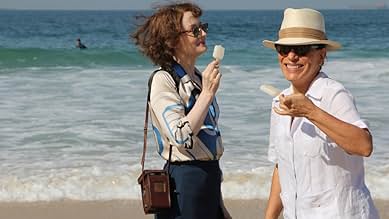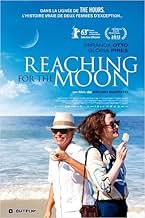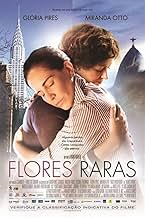CALIFICACIÓN DE IMDb
7.0/10
3.7 k
TU CALIFICACIÓN
Crónica de la trágica historia de amor entre la poetisa estadounidense Elizabeth Bishop y la arquitecta brasileña Lota de Macedo Soares.Crónica de la trágica historia de amor entre la poetisa estadounidense Elizabeth Bishop y la arquitecta brasileña Lota de Macedo Soares.Crónica de la trágica historia de amor entre la poetisa estadounidense Elizabeth Bishop y la arquitecta brasileña Lota de Macedo Soares.
- Dirección
- Guionistas
- Elenco
- Premios
- 9 premios ganados y 21 nominaciones en total
Opiniones destacadas
This is a beautifully filmed movie about the lives of two exceptional women whose lives collided in the early 50s and went on for 17 years. Oh - it's a true story, BTW.
The locations are spectacular in a quiet way and worth the watch on their own. They added one star.
I am ashamed to say I was not aware of Elizabeth Bishop. Now I am looking forward to reading her material.
Hope you enjoy this film.
The locations are spectacular in a quiet way and worth the watch on their own. They added one star.
I am ashamed to say I was not aware of Elizabeth Bishop. Now I am looking forward to reading her material.
Hope you enjoy this film.
I enjoyed this story of a lengthy midlife love affair, "based on" (that is, "not cemented to the known facts of") real women of some mid-century renown. One, American poet Elizabeth Bishop, is quiet, slow to warm to strangers or share working drafts of her poems. See if Miranda Otto doesn't remind you of Deborah Kerr in her memorable 1940s and '50s roles (and clothes). In Brazil to visit an old college friend, Elizabeth meets Lota de Macedo Soares, a charismatic commander of attention and glamorously trousered architect. They become lovers and make their life in Brazil. All the characters, including a close male friend of Lota's and one of Elizabeth's, are revelations in the best sense: mature but unfinished adults, they meet their circumstances over nearly 20 years in ways not even they might be able to predict. Mark Twain said that fiction is obliged to meet our expectations but the truth isn't. Central Casting can provide "types," but history offers people like nobody else, which is why you'll find discussions here and elsewhere complaining that these lesbians were not put through their proper lesbian plot paces! The drunks were sometimes sober! People got depressed without enough foreshadowing! Ignore all that. This is a good quiet story, mostly but not all sad, about people learning themselves as they go, living genuinely if not always bravely.
And anyone who's ever dreamed of having a writer's sanctuary will fall rapturously in love with the al fresco study Lota builds for Elizabeth. Must be seen to be appreciated!
And anyone who's ever dreamed of having a writer's sanctuary will fall rapturously in love with the al fresco study Lota builds for Elizabeth. Must be seen to be appreciated!
Lovely. A story here that is not overshadowed by the relationships, politics, or agenda. It is, simply beautifully filmed, the beaches of Rio De Janeiro, the beautiful home Lota has deigned in part to accommodate her new lover, poet Elizabeth Bishop, completely played by Miranda Otto.
Otto is at once restrained yet yearning, a Vassar graduate visiting her friend, who initially is puzzled (and indeed overwhelmed) by the beauty and passion of South America.
She plays the American New England spinster type well, without a stereotype here. We can feel she wants, and NEEDS to break free from societal restraints.
The filming of the rain forests, the owls at night, the visuals are incredible. Lota Soares was politically connected and designed the park near Carioca beach, the title infers, reaching for the moon has so may more connotations for each woman.
What is most refreshing is the way this film is written, sensitive to the issues each woman experiences, it is an individual and a private journey.
The actress portraying Carlotta Soares is affecting and sad, and Miranda Otto is quite believable as Bishop. The story is beautiful and sad, and the scenery of Brazil is not to be missed, simply beautiful, and beautifully filmed. 10/10
Otto is at once restrained yet yearning, a Vassar graduate visiting her friend, who initially is puzzled (and indeed overwhelmed) by the beauty and passion of South America.
She plays the American New England spinster type well, without a stereotype here. We can feel she wants, and NEEDS to break free from societal restraints.
The filming of the rain forests, the owls at night, the visuals are incredible. Lota Soares was politically connected and designed the park near Carioca beach, the title infers, reaching for the moon has so may more connotations for each woman.
What is most refreshing is the way this film is written, sensitive to the issues each woman experiences, it is an individual and a private journey.
The actress portraying Carlotta Soares is affecting and sad, and Miranda Otto is quite believable as Bishop. The story is beautiful and sad, and the scenery of Brazil is not to be missed, simply beautiful, and beautifully filmed. 10/10
I was sad to see this deeply moving, complex and intelligent story of the love between the award winning American poet Elizabeth Bishop and Brazilian architect Lota de Macedo Soares. so overlooked by U.S, audiences and critics. There are two outstanding performances by Miranda Otto as the outwardly shy and repressed alcoholic Bishop, and Gloria Pires as her opposite, an extroverted, highly emotional woman who coaxes Bishop out of her shell.
Very nicely photographed, this reminded me of the best of the Merchant-Ivory films. It's not flashy. Indeed there's a quiet to it that is needed to off-set the melodramatic (even if based in truths) elements of these women's lives. But that doesn't keep it from packing a hell of an emotional punch, and in being bold enough to create characters we care for, but who are also deeply troubled and capable of making bad choices – just like in the real world of relationships we rarely see on screen. It was also nice to see a gay-themed love story that both acknowledged how difficult being homosexual was in the 1950s, while not becoming a film about that only. This is a film about a complex relationship between two highly creative and wounded souls who both save and damage each other. The fact that both are women is only a small part of the larger story. It's also one of the only films I've seen capture at least a taste of the struggle and loneliness of the act of writing.
One of those little gems that deserves to be discovered by more people.
Very nicely photographed, this reminded me of the best of the Merchant-Ivory films. It's not flashy. Indeed there's a quiet to it that is needed to off-set the melodramatic (even if based in truths) elements of these women's lives. But that doesn't keep it from packing a hell of an emotional punch, and in being bold enough to create characters we care for, but who are also deeply troubled and capable of making bad choices – just like in the real world of relationships we rarely see on screen. It was also nice to see a gay-themed love story that both acknowledged how difficult being homosexual was in the 1950s, while not becoming a film about that only. This is a film about a complex relationship between two highly creative and wounded souls who both save and damage each other. The fact that both are women is only a small part of the larger story. It's also one of the only films I've seen capture at least a taste of the struggle and loneliness of the act of writing.
One of those little gems that deserves to be discovered by more people.
The Brazilian movie Flores Raras was shown in the United States with the title Reaching for the Moon (2013). It was directed by Bruno Barreto.
The film is based on the life of the great American poet, Elizabeth Bishop (Miranda Otto). As the movie begins, Elizabeth is traveling in Brazil, and visits the estate of the famous architect Lota de Macedo Soares, played by Glória Pires. Lota is in a lesbian relationship with Bishop's college friend Mary (Tracy Middendorf).
Despite Elizabeth's somewhat proper and restricted outlook, she accepts the love offered by Lota, even though this leaves Mary as the odd woman out. This act struck me as a shabby betrayal of an old friend, but, in the movie, it's treated as true love that makes such betrayal acceptable, if not inevitable.
It doesn't hurt that Lota has an enormous estate, and enormous resources. As an architect, Lota is able to envision and then design a beautiful writer's studio for Elizabeth.
The strong point of the movie is that it presents the writing of poetry as work. Elizabeth doesn't just close her eyes and wait until the poetic muse strikes her. She sits in the studio and pushes and pulls her poetry into shape. She's also not happy when she's interrupted during the creative process. This is the only film I can remember where creating a poem is shown as a process, and a delicate and difficult process at that.
This idyllic existence is disrupted by Brazilian political events, into which Lota plunges. The remainder of the movie is devoted to how these events play out in the lives of Elizabeth and Lota.
I don't know enough about the details of the coup, or of the lives of the film's principals, to know how accurately the film portrays them. This aspect of the movie is highly melodramatic, but the actual events were probably equally melodramatic. Certainly, the film holds your interest as the situation plays itself out to the end.
We saw this movie on the large screen, where it will work better, especially in the scenes set on Lota's estate. However, it will work well enough on the small screen. It's not a great movie, but it's certainly good enough to repay you for finding and watching it.
The film is based on the life of the great American poet, Elizabeth Bishop (Miranda Otto). As the movie begins, Elizabeth is traveling in Brazil, and visits the estate of the famous architect Lota de Macedo Soares, played by Glória Pires. Lota is in a lesbian relationship with Bishop's college friend Mary (Tracy Middendorf).
Despite Elizabeth's somewhat proper and restricted outlook, she accepts the love offered by Lota, even though this leaves Mary as the odd woman out. This act struck me as a shabby betrayal of an old friend, but, in the movie, it's treated as true love that makes such betrayal acceptable, if not inevitable.
It doesn't hurt that Lota has an enormous estate, and enormous resources. As an architect, Lota is able to envision and then design a beautiful writer's studio for Elizabeth.
The strong point of the movie is that it presents the writing of poetry as work. Elizabeth doesn't just close her eyes and wait until the poetic muse strikes her. She sits in the studio and pushes and pulls her poetry into shape. She's also not happy when she's interrupted during the creative process. This is the only film I can remember where creating a poem is shown as a process, and a delicate and difficult process at that.
This idyllic existence is disrupted by Brazilian political events, into which Lota plunges. The remainder of the movie is devoted to how these events play out in the lives of Elizabeth and Lota.
I don't know enough about the details of the coup, or of the lives of the film's principals, to know how accurately the film portrays them. This aspect of the movie is highly melodramatic, but the actual events were probably equally melodramatic. Certainly, the film holds your interest as the situation plays itself out to the end.
We saw this movie on the large screen, where it will work better, especially in the scenes set on Lota's estate. However, it will work well enough on the small screen. It's not a great movie, but it's certainly good enough to repay you for finding and watching it.
¿Sabías que…?
- TriviaFour paragraphs appear between the end of the film and the beginning of the credits.
1. "Few women write major poetry. Only four stand with our best men: Emily Dickinson, Marianne Moore, Elizabeth Bishop and Sylvia Plath." - Robert Lowell
2. "I'd rather be called the 'The 16th Poet' with no reference to my sex, than one of 4 women - even if the other three are pretty good." - Elizabeth Bishop
3. Elizabeth Bishop died in 1979 in the United States. She is considered on the most important poets of the English language.
4. In 2012, UNESCO declared the city of Rio De Janeiro a World Heritage site. The Flamengo Park is one of its main attractions.
- ErroresOpening in 1951 but Bobby Vinton singing Blue Velvet was not until 1963.
- Citas
Elizabeth Bishop: It's OK. I'm not drunk. I'm just crying in English.
- Créditos curiososNine of the main performers (the first 10) are listed in the credits without the name of their character. Only Treat Williams is credited as his character, Robert Lowell.
- ConexionesReferenced in Programa do Jô: Episode dated 26 August 2013 (2013)
Selecciones populares
Inicia sesión para calificar y agrega a la lista de videos para obtener recomendaciones personalizadas
- How long is Reaching for the Moon?Con tecnología de Alexa
Detalles
- Fecha de lanzamiento
- País de origen
- Sitios oficiales
- Idiomas
- También se conoce como
- Reaching for the Moon
- Locaciones de filmación
- Productoras
- Ver más créditos de la compañía en IMDbPro
Taquilla
- Total en EE. UU. y Canadá
- USD 45,502
- Fin de semana de estreno en EE. UU. y Canadá
- USD 14,573
- 10 nov 2013
- Total a nivel mundial
- USD 1,534,391
- Tiempo de ejecución1 hora 58 minutos
- Color
- Relación de aspecto
- 1.85 : 1
Contribuir a esta página
Sugiere una edición o agrega el contenido que falta


























